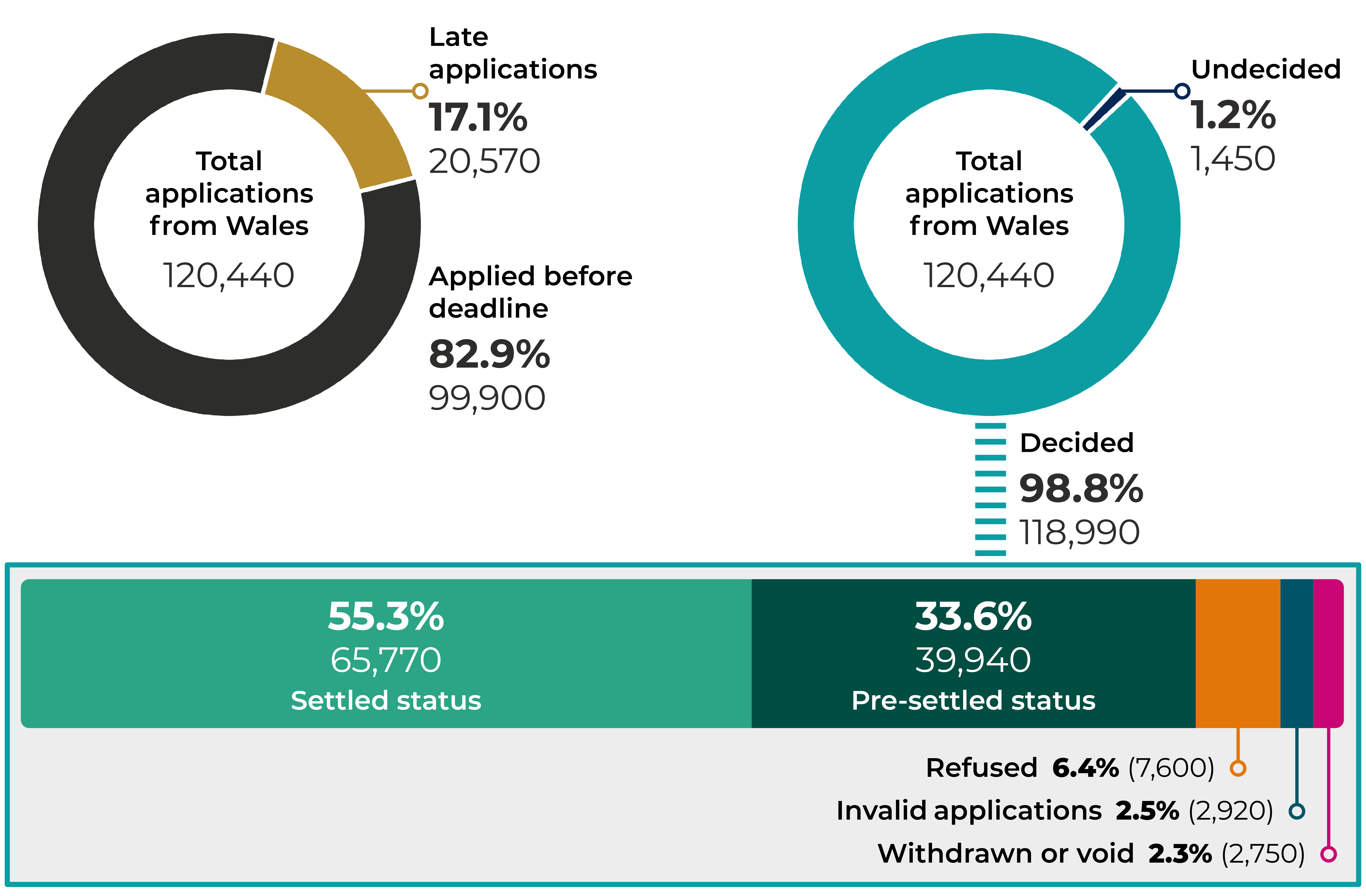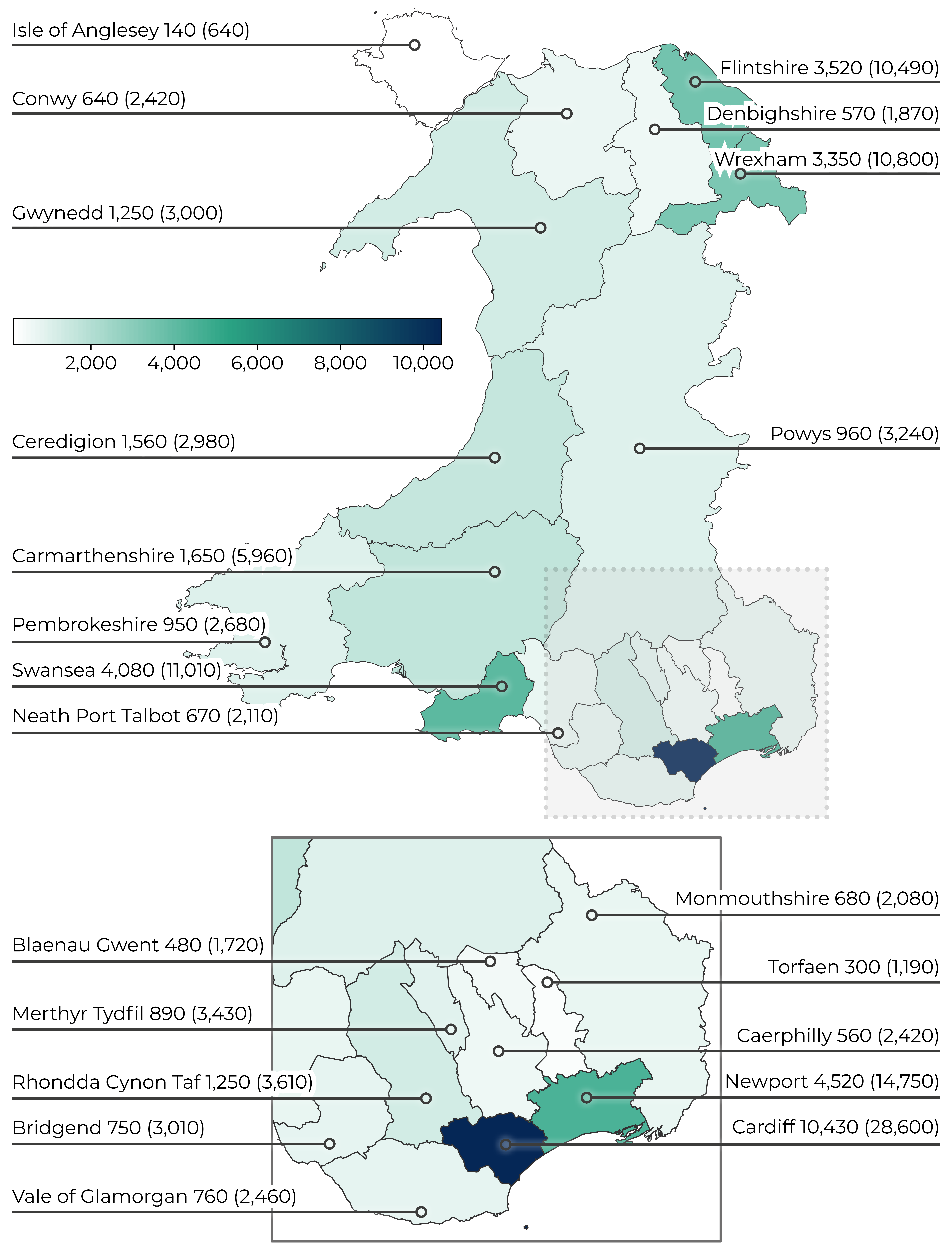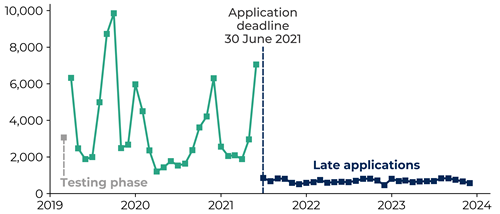Europeans who lived in the UK before Brexit had to apply to stay before 30 June 2021.
Though that deadline was nearly three years ago, the UK Government still receives hundreds of applications from Wales every month to its EU Settlement Scheme (EUSS). Since the deadline passed in June 2021, monthly applications haven’t dropped below 460 and in 2023, there were 570-830 each month.
The Senedd’s Equality and Social Justice Committee (“the Committee”) was established in June 2021 - the same month as the EUSS application deadline. It has monitored the EUSS ever since and its second annual report, published on 8 April, is the culmination of this work.
This article is the latest in our series on EUSS statistics and summarises the Committee’s findings.
Remaining in Wales?
Europeans applying to the EUSS receive one of many possible outcomes. To stay, citizens need either ‘settled’ (permanent) or ‘pre-settled’ (five year) status. Unsuccessful applications are categorised as refused, invalid, withdrawn or void.
The latest statistics show there were 120,440 applications from Wales up to 31 December 2023. 20,570 (17.1%) were late applications, submitted after the 30 June 2021 deadline.
118,990 (98.8%) applications were decided before the cut off for producing the statistics.
Of these, 65,770 (55.3%) were granted settled status and 39,940 (33.6%) pre-settled status. This means that 105,710 Europeans can remain in Wales, either permanently or temporarily. This surpasses original estimates of 95,000 eligible citizens by 10,710 so far.
13,270 (11.2%) applications were unsuccessful. Of these, 7,600 (6.4%) were refused, 2,750 (2.3%) were withdrawn or void and 2,920 (2.5%) were invalid.
EUSS applications from Wales by date, decided applications and outcomes by percentage and number

Source: UK Government EU Settlement Scheme quarterly statistics, December 2023 Numbers are rounded to the nearest 10 therefore breakdowns may not match overall totals.
The map below shows the number of pre-settled citizens in each Welsh local authority area. The total number of EUSS applications are shown in brackets:
Number of pre-settled citizens and total number of EUSS applications, by local authority

Source: UK Government EU Settlement Scheme quarterly statistics, December 2023 Numbers are rounded to the nearest 10 therefore breakdowns may not match overall totals.
Key issues for the Equality and Social Justice Committee
Since its first monitoring report in October 2021, the Committee has monitored key issues for European citizens wanting to stay in Wales after Brexit.
Its first annual report raised concerns for citizens making late applications and those who’ve made no application and risk being denied services, or even deported. It also noted disappointment that the EUSS family permit route wasn’t extended to provide another route to the UK for Ukrainians fleeing the war.
Other key issues include:
- statistical gaps;
- high number of late applications;
- Welsh Government funding for free advice and support; and
- how the Welsh and UK governments work together.
Latest developments
In November 2023, the Committee asked the Welsh Government for its views on the latest issues. Use the drop-down menus below for more information and to see the response from the former Minister for Social Justice and Chief Whip, Jane Hutt.
|
Background |
Welsh Government response |
|
In response to a High Court ruling, the Home Office announced changes to the EUSS so that pre-settled citizens will:
These changes will affect the 39,940 pre-settled citizens in Wales. Other changes to the EUSS include narrowed application guidance and the removal of a right to have a decision reviewed. |
The former Minister welcomes some changes as reducing burdens on citizens and the likelihood of people not having a secure status. Welsh Government resources have been updated to reflect the changes. However, the Welsh Government wasn’t consulted on the changes and received no advance warning from the UK Government. The former Minister:
|
|
Background |
Welsh Government response |
|
Late applications continue to be received from Wales at a rate of 570-830 per month in 2023. Number of monthly applications from Wales to the EUSS
View full size image |
The former Minister says:
|
|
Background |
Welsh Government response |
|
Since 2019, the Welsh Government has provided over £2.7million in short-term free advice and support services to help EUSS applicants, which has been regularly extended. |
Funding for advice services is extended again until 31 March 2024 and support services for Gypsy, Roma and Traveller communities are being retendered. |
|
Background |
Welsh Government response |
|
In May 2023, the Financial Times reported around 141,000 European citizens who’d received benefits and NHS treatment while waiting for a decision had to pay the amounts back. Their digital status showed as ‘pending’ and hadn’t updated to show a refusal decision. |
No EU citizens have been affected by the error in Wales. The former Minister says that officials have checked with every local health board to confirm this. |
|
Background |
Welsh Government response |
|
UK-wide statistics show the number of applications from Ukrainians but breakdowns by each UK nation aren’t available. However, the UK Government told the Welsh Government in March 2023 that 80 applications with a Welsh address were received. There were 15,700 Ukrainian applications UK-wide up to 31 December 2023. |
No further breakdown for Wales is available and the Welsh Government is not aware of specific EUSS issues for Ukrainians in Wales. |
|
Background |
Welsh Government response |
|
A report by the UK’s EUSS watchdog, the Independent Monitoring Authority (IMA) reviewed the EUSS support provided by local authorities, health and social services to looked after children and care leavers. It found a number of issues, like a lack of documented processes and accurate record keeping. |
As a result of measures taken by local authorities in response, the IMA has now graded all 22 local authorities as ‘green’, which the Welsh Government commends. |
Next steps
Almost three years since the application deadline, the EUSS continues to be a key feature of post-Brexit Wales. The Committee’s report and exchanges with the former Minister reflect many emerging complexities as more time passes.
The Committee’s called on the Welsh Government to continue to support European citizens living in Wales in the future and to work with the UK Government to do this. It recommends the government closely monitors changes to the EUSS described above and continues targeting support at harder to reach, underrepresented and vulnerable groups, including the Roma community.
While it awaits a response from the Welsh Government, the Committee has agreed to publish regular Wales-focused reports throughout this Senedd. This means that the Senedd will be kept informed of the issues discussed here until at least the next Senedd election in 2026.
Article by Sara Moran, Helen Jones and Joe Wilkes, Senedd Research, Welsh Parliament







